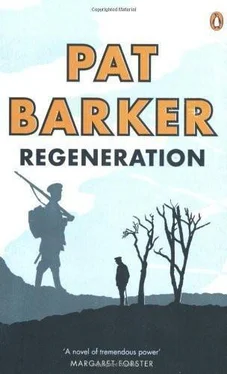He got dressed and sat on the bed. At last eight o’clock came, and the hospital became noisy as the shifts changed. Sassoon ran downstairs. He felt certain Rivers would go to his office to check the post before he left, and there might just be time for a few words. But when he tapped on the door, a passing orderly said, ‘Captain Rivers’s gone, sir. He left on the six o’clock train.’
So that was that. Sassoon went slowly upstairs, unable to account for his sense of loss. After all, he’d known Rivers was going. And he was only going for three weeks. Fothersgill was still asleep. Sassoon collected his washbag and went along to the bathroom. He felt almost dazed. As usual he turned to lock the door, and as usual remembered there were no locks. At times like this the lack of privacy was almost intolerable. He filled the basin, and splashed his face and neck. Birds, sounding a little stunned as if they too needed to recover from the night, were beginning, cautiously, to sing. He looked at his face in the glass. In this half-light, against white tiles, it looked scarcely less ghostly than Orme’s. A memory tweaked the edges of his mind. Another glass, on the top landing at home, a dark, oval mirror framing the face of a small, pale child. Himself. Five years old, perhaps. Now why did he remember that? Birds had been singing, then, too. Sparrows, twittering in the ivy. A day of shouts and banged doors and tears in rooms he was not allowed to enter. The day his father left home. Or the day he died? No, the day he left. Sassoon smiled, amused at the link he’d discovered, and then stopped smiling. He’d joked once or twice to Rivers about his being his father confessor, but only now, faced with this second abandonment, did he realize how completely Rivers had come to take his father’s place. Well, that didn’t matter, did it? After all, if it came to substitute fathers, he might do a lot worse. No, it was all right. Slowly, he lathered his face and began to shave.
‘Hymn No. 373.’
With a rustling of paper the maroon-backed hymn books blossomed into white. The congregation struggled to its feet. Children at the front under the watchful eye of Sunday-school teachers, the rest, middle-aged or elderly men, and women. A preliminary wheeze from the organ, then:
God moves in a mysterious way
His wonders to perform…
Since the Somme, this seemed to have become the nation’s most popular hymn. Rivers had lost count of the number of times he’d heard it sung. He lifted his eyes to the flag-draped altar, and then to the east window. A crucifixion. The Virgin and St John on either side, the Holy Ghost descending, God the Father beaming benignly down. Beneath it, and much smaller, Abraham’s sacrifice of his son. Behind Abraham was the ram caught in a thicket by his horns and struggling to escape, by far the best thing in the window. You could see the fear. Whereas Abraham, if he regretted having to sacrifice his son at all, was certainly hiding it well and Isaac, bound on a makeshift altar, positively smirked.
Obvious choices for the east window: the two bloody bargains on which a civilization claims to be based. The bargain, Rivers thought, looking at Abraham and Isaac. The one on which all patriarchal societies are founded. If you, who are young and strong, will obey me, who am old and weak, even to the extent of being prepared to sacrifice your life, then in the course of time you will peacefully inherit, and be able to exact the same obedience from your sons. Only we’re breaking the bargain, Rivers thought. All over northern France, at this very moment, in trenches and dugouts and flooded shell-holes, the inheritors were dying, not one by one, while old men, and women of all ages, gathered together and sang hymns.
Blind unbelief is sure to err,
And scan His works in vain;
He is His own interpreter
And He will make it plain. Amen.
The congregation, having renounced reason, looked rather the happier for it, and sat down to await the sermon. Charles leant towards Rivers and whispered, ‘He doesn’t usually go on very long.’
That whisper brought back the Sunday mornings of their childhood when they’d drive to church in a pony and trap, and spent the sermon looking up the naughty bits in the Old Testament, a task made easier by the grubby fingerprints of those who had gone before. He remembered Michal’s bride-price: an hundred foreskins of the Philistines. As an anthropologist, he still found that fascinating. He remembered the smell of hassocks, and fastened his eyes on the flag-draped altar. They would never come back, those times.
The vicar had reached the top of the pulpit steps. A faint light flashed on his glasses as he made the sign of the cross. ‘In the name of the Father and of the Son and of the Holy Ghost…’
Charles was busy with a great rehousing of the hens. They were to be transferred from deep litter in the barn to the new coops in Two-acre Field. This was best done after dusk when the hens were drowsy and less likely to rebel. The brothers lingered over tea in the living room, and then went out across the black, sodden, dismal mud of the yard towards the large, low barn. Rivers was wearing a pair of old cord breeches kept up with one of his brother’s belts, visible proof that Bertha’s strictures on his loss of weight were justified. ‘It isn’t as if,’ she said at every mealtime, piling his plate high, ‘you had it to lose.’ ‘He’s all right, Bertha, leave him alone,’ Charles always said, though it made no difference. Rivers still staggered away from the table feeling that he’d been force-fed.
Charles carried the hens easily, his arms binding the wings fast to his sides. Rivers, less expert, picked up two birds and set off after him. His fingers dug through the fluffiness into the surprisingly hard quills, and touched clammy flesh. The blood-red combs jiggled as he walked, amber eyes looked up with a kind of bright vacuity. As he tried to nudge the farmyard gate open with his elbow, one of them got its wings free and flapped frantically until he managed to subdue it again. God, I hate hens, he thought.
The chicken farm had been his idea, after Charles came back from the East with malaria. Work in the open air, Rivers had advised. He was paying for it now. As he left the shelter of the hedge and set off across Two-acre Field, a great gust of ‘open air’ almost lifted him off his feet. He felt responsible for the farm idea, and it wasn’t paying. At the moment they were only just breaking even. Mainly it was the effect of the war. Feed was scarce and expensive, male help impossible to get. The last land girl had stayed only long enough to work out the distance to the nearest town, before discovering that some domestic crisis required her immediate return home. But even without the war it might not have been easy. Hens had a curious way of not thriving. They seemed to be subject to a truly phenomenal range of diseases and to take a perverse pleasure in working their way down the list.
It was almost completely dark now, a few faint stars pricking through the clear sky. One hen, weaker than the rest, was being picked on by the others. Its chest was bare of feathers and raw where they’d pecked at it.
‘I’ll have to get that one out and wring its neck,’ Charles said.
‘Can’t you just isolate her and then put her back in?’
‘No. Once they start they never stop.’
They turned and walked back. McTavish, the farm cat, a black, battered tom, met them at the corner of the yard and preceded them across it. A notably morose cat, McTavish, a defect of temperament Rivers attributed to his being perpetually surrounded by forbidden flesh. He was fond of McTavish and slipped him titbits from his plate whenever he thought Bertha wasn’t looking.
Читать дальше












